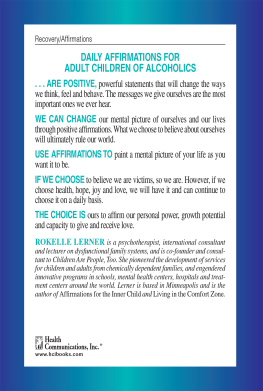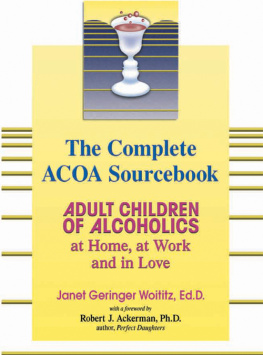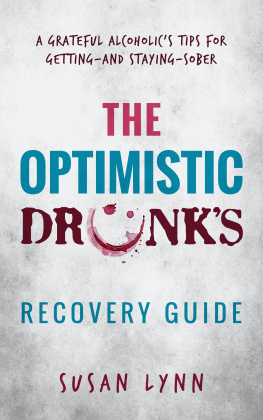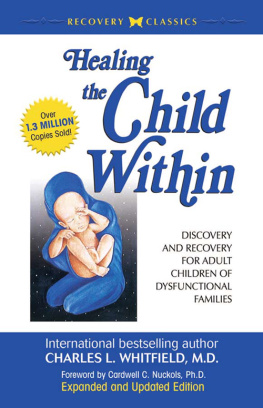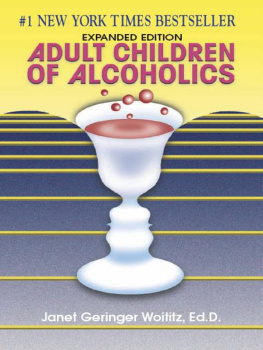About the Authors
Herbert L. Gravitz, Ph.D., is a Clinical Psychologist in Santa Barbara, California. He is a founding Board Member of the National Association for Children of Alcoholics (NACOA), and currently serves on the Advisory Board. He was Executive Editor of The Network, a publication of NACOA and authored the Children of Alcoholics Handbook.
Julie D. Bowden, M.S., is a Marriage, Family, and Child Psychotherapist in private practice in Santa Barbara, California. She developed the first Alcohol/Drug Awareness Program for the University of California system and has consulted on both inpatient and outpatient recovery programs. She is a founding Board Member of the National Association for Children of Alcoholics (NACOA), and its first treasurer. She currently serves on the Advisory Board. She is the adult child of an alcoholic.
Together, they conduct recovery retreats, individual and group psychotherapy, and educational seminars for adult children of alcoholics as well as other adult children of trauma and the professionals who serve them. They began the University of Californias first therapy group specifically for adult children of alcoholics. They have authored numerous articles and are coauthors of an upcoming book, Genesis: The Spiritual Dimension of Recovery for Children of Alcoholics and Other Children of Trauma.
Acknowledgments
Thanks to: Bill B., John M., Linda B., Jerry W., Pam D., Rick U., Suzanne E., and Sue Y.; our first psychotherapy group for Adult Children of Alcoholics at the University of California at Santa Barbara in 1981; The Santa Barbara City College Adult Education Program, particularly Ellen Downing for faith in us and the opportunity to work with over 1,500 adult children who taughtand continued to teachus countless lessons; John Stoddard for encouragement and cheer; Luis Tovar for insightful assistance on minority adult children; Raymond Wilcove for his proofreading acumen; and Danna Downing for her enthusiastic, negotiable, and humane approach to editing.
Especial thanks go to Linda Mears of Copy Desk for her heroic and talented help. She unselfishly met every difficult deadline we asked. She transcribed our initial tapes and typed on first draft. Without her, this book would have stumbled and stalled.
We also thank our teachers and colleagues on the Board of Directors of the National Association for Children of Alcoholics, who very early expressed faith in our work. We have never seen a finer group of human beings! Dr. Robert Ackerman was especially encouraging and supportive.
Finally, we thank the many others who gave of their time, their heart, and their pain and who are not mentioned by name because of lack of spacenot gratitude.
Appendix A
Recommended Reading
Ackerman, R. J., Children of Alcoholics: A Guidebook for Educators, Therapists, and Parents, (2nd Ed.). Holmes Beach, FL: Learning Publications, 1983.
One of the first books on school-age children of alcoholics. An early consciousness-raiser.
Black, C., It Will Never Happen To Me, Denver, CO: Medical Administration Company, 1982.
A classic on adult children of alcoholics. Must reading.
Brooks, C., The Secret Everyone Knows, San Diego, CA: The Kroc Foundation, 1981.
The simple heartfelt personal story of an adult child of an alcoholic.
Cork, M., The Forgotten Children, Toronto: Alcohol and Drug Addiction Research Foundation, 1969.
One of the very first books to discuss the needs and issues of children of alcoholics.
Drews, T. R., Getting Them Sober, South Plainfield, NJ: Bridge Publishing, Inc., 1980.
A delightfully simple and helpful book for the family of the alcoholic.
Greenleaf, J., Co-AlcoholicPara-Alcoholic: Whos Who and Whats The Difference? Los Angeles, CA: 1981.
A classic on adult children of alcoholics. Must reading.
Milam, J. R., and Ketcham, K., Under The Influence: A Guide to the Myths and Realities of Alcoholism. Seattle, WA: Madrona Publishers, Inc., 1981.
One of the best books on the physiology of alcoholism. Essential reading for understanding this disease.
Wegschieder, S., Another Chance: Hope and Health for the Alcoholic Family. Palo Alto, CA: Science and Behavior Books, 1981.
Written for both the professional and layperson, this is one of the clearest descriptions of the family plight. Must reading.
Whitfield, C. L., Alcoholism, Other Drug Problems, and Spirituality: Stress Management and Serenity During Recovery. Preprint publication available from P & T Book Sellers, 1-800-321-7912, Baltimore, MD, 1985.
Woititz, J. G., Adult Children of Alcoholics. Hollywood, FL: Health Communications, Inc., 1983.
An important book describing the problems of adult children of alcoholics.
Woititz, J. G., Marriage on the Rocks. NY: Delacorte Press, 1979.
Possibly the best book available for the spouse of an alcoholic. Must reading.
Appendix B
Where To Get More Help
Al-Anon/Alateen Family Group Headquarters, Inc.
Madison Square Station
New York, New York 10010
(212) 683-1771
Alcoholics Anonymous World Services, Inc.
468 Park Avenue South
New York, New York 10016
(212) 686-1100
National Association for Children of Alcoholics
31706 Coast Highway, Suite 201
South Laguna, CA 92677
(714) 499-3889
National Council on Alcoholism
12 West 21st Street
New York, New York 10010
(212) 206-6770
National Clearinghouse for Alcohol Information
P.O. Box 1908
Rockville, Maryland 20850
(301) 468-2600
A Final Note From the Authors
What we said in the very beginning of the book is perhaps clearer to you now. You already knew much of what we would say, although you may not have known you knew. The human mind and spirit have many more resources than you realize. They reign over a vast territory of undiscovered potential.
We would like to leave you with one last thought. When alcoholism starts in a family, it moves through the generations. The person who becomes the alcoholic marries the person who becomes the co-alcoholic. Together they have children who themselves often become alcoholic or marry an alcoholic. These adult children will also get married, often to an alcoholic or co-alcoholic. They will have children, and so the cycle repeats.
When recovery occurs, it too is carried through the generations. Everyone has the potential to move through the stages of recovery. And while we each move at our own rate, recovery itself becomes progressive, once started, propelling us forward. You can start a new generation of recovery in your familys history. Know it. Feel it. Believe it. And you can make it happen!
Introduction
Leslie was mesmerized. The muscles around her eyes tightened as the shock of recognition crossed her face. The stories she was hearing sounded just like hers! The other people in this group, who looked so picture-perfect, had experienced the same abandonment, the same loss of childhood, the same sense of betrayal that she had felt in a home dominated by an alcoholic parent.
Ann, who had recently celebrated her eighty-first birthday, relaxed as she heard others describe the embarrassment of their childhoodsthe humiliations, the insults, the times they were afraid to come home, and those terrible holiday scenes. As the shrouds of silence slowly disappeared, she was no longer feeling isolated and alone. There were no secrets here. These were her stories too.
Brian was trembling. He was thinking of his parents. Pangs of guilt pierced his stomach. For the first time he actually talked about what went on in his family. He dared say out loud to others that his parents were alcoholic. He fidgeted as he forced himself not to pretend anymore. But it was hard! Scary! Yet, somewhere at the edge of his awareness, there was a feeling, a real feeling, that he did not want to deny.


